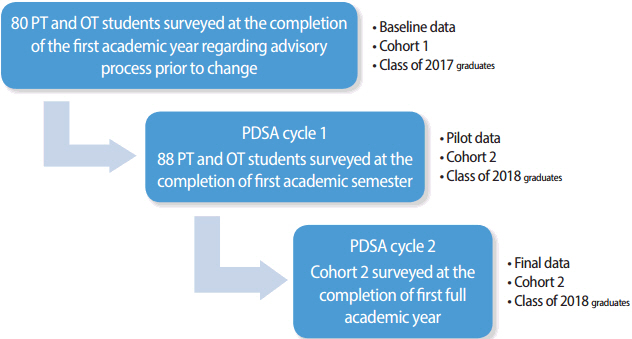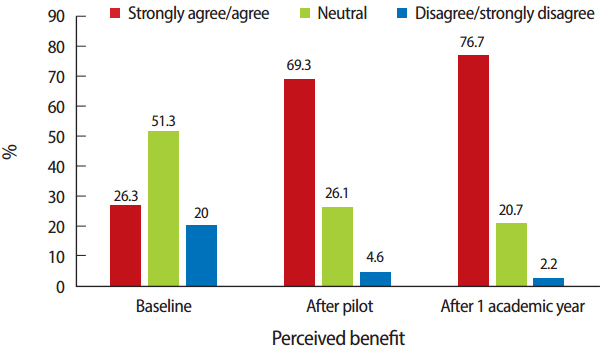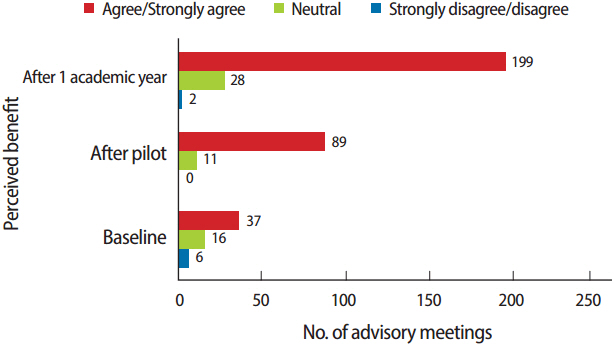J Educ Eval Health Prof.
2017;14:4. 10.3352/jeehp.2017.14.4.
Improving student-perceived benefit of academic advising within education of occupational and physical therapy in the United States: a quality improvement initiative
- Affiliations
-
- 1Department of Physical Therapy, School of Health Related Professions, The University of Mississippi Medical Center, Jackson, MS, USA. Lbarnes@umc.edu
- 2Department of Occupational Therapy, School of Health Related Professions, The University of Mississippi Medical Center, Jackson, MS, USA.
- KMID: 2406667
- DOI: http://doi.org/10.3352/jeehp.2017.14.4
Abstract
- Academic advising is a key role for faculty in the educational process of health professionals; however, the best practice of effective academic advising for occupational and physical therapy students has not been identified in the current literature. The purpose of this quality improvement initiative was to assess and improve the faculty/student advisor/advisee process within occupational and physical therapy programs within a school of allied health professions in the United States in 2015. A quality improvement initiative utilizing quantitative and qualitative information was gathered via survey focused on the assessment and improvement of an advisor/advisee process. The overall initiative utilized an adaptive iterative design incorporating the plan-do-study-act model which included a three-step process over a one year time frame utilizing 2 cohorts, the first with 80 students and the second with 88 students. Baseline data were gathered prior to initiating the new process. A pilot was conducted and assessed during the first semester of the occupational and physical therapy programs. Final information was gathered after one full academic year with final comparisons made to baseline. Defining an effective advisory program with an established framework led to improved awareness and participation by students and faculty. Early initiation of the process combined with increased frequency of interaction led to improved student satisfaction. Based on student perceptions, programmatic policies were initiated to promote advisory meetings early and often to establish a positive relationship. The policies focus on academic advising as one of proactivity in which the advisor serves as a portal which the student may access leading to a more successful academic experience.
MeSH Terms
Figure
Reference
-
References
1. Myhre DL, Sherlock K, Williamson T, Pedersen JS. Effect of the discipline of formal faculty advisors on medical student experience and career interest. Can Fam Physician. 2014; 60:e607–e612.2. Harrison E. What constitutes good academic advising?: nursing students’ perceptions of academic advising. J Nurs Educ. 2009; 48:361–366. https://doi.org/10.3928/01484834-20090615-02.
Article3. Harrison E. (Re)visiting academic advising. Nurse Educ. 2009; 34:64–68. https://doi.org/10.1097/NNE.0b013e31819907ff.
Article4. Shochet RB, Cayea D, Levine RB, Wright SM. Commentary: using medical student case presentations to help faculty learn to be better advisers. Acad Med. 2010; 85:578–579. https://doi.org/10.1097/ACM.0b013e3181da4ab6.
Article5. Gasper ML. Building a community with your advisees. Nurse Educ. 2009; 34:88–94. https://doi.org/10.1097/NNE.0b013e3181990eb9.
Article6. Speroff T, O’Connor GT. Study designs for PDSA quality improvement research. Qual Manag Health Care. 2004; 13:17–32. https://doi.org/10.1097/00019514-200401000-00002.
Article
- Full Text Links
- Actions
-
Cited
- CITED
-
- Close
- Share
- Similar articles
-
- Analysis of the Clinical Education Situation framework: a tool for identifying the root cause of student failure in the United States
- A Comparative Analysis of Accreditation System for Health Information Management Education and Curriculum in the Republic of Korea and the United States of America
- Continuing education requirements among State Occupational Therapy Regulatory Boards in the United States of America
- A Systematic Career Advising Model and Strategies for Medical Students
- Integrated clinical experience with concurrent problem-based learning is associated with improved clinical reasoning among physical therapy students in the United States




